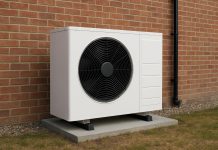
Major energy users such as supermarkets and data centres could achieve serious energy and cost savings and drive down UK peak demand if they were less fearful of failure, according to Marks & Spencer’s former energy management boss.
Mervyn Bowden, who now runs his own consultancy Intuitive Energy Solutions, said major energy users could avoid high electricity charges resulting from demand in peak periods (so-called Triad charges, retrospectively set during three peak periods over winter by National Grid) if they really wanted to.
“I think from a user perspective, not enough effort has really gone into coming up with more innovative ways of mitigating Triad charges,” said Bowden.
“There are lots of examples in things like food refrigeration in supermarket chains, where all the refrigeration could be put on defrost for significantly longer periods during the Triad period. They would save potentially 35-40% of their load during that period but they are very reticent about it because of the risk of failure of the equipment.”
Data centres
Bowden said data centres could potentially achieve greater savings – and not just during peak demand periods.
“There has been quite a significant awareness of measures in that space to increase [maximum] data centre temperatures for example, so there is not as much cooling going in. That results in significantly lower demand,” said Bowden.
But data centres have to deliver maximum reliability. Is over-cooling not just a sensible precaution?
“They do… but the issue there is that every degree you can raise the temperature has a massive energy saving impact. If you can raise the temperature of every data centre in the country from say, 19-20 °C up to 25 °C, with no great loss of response time on the kit, that would be a huge prize.”
Is that technically feasible, without increasing the risk of failure? Bowden thinks so. But theory must be proven, he said.
“There are lots of mixed messages in the space. But a lot of IT infrastructure now will happily operate at core India temperatures, 35-40 °C. Yet here we are in the UK chilling data space to low twenties [degrees centigrade] if you’re lucky, on the premise that if they get too hot [they might fail]. Well, they might not,” said Bowden. “Has anybody checked?”
It would be worth challenging assumptions and undertaking some rigorous research to prove the theory, said Bowden.
“It’s worth looking at a whole range of issues around data centres. What is in them? Does it need to be in them? Does it need to be temperature protected at all? You could well end up with a data room that is potentially half the size using potentially half the energy,” Bowden suggested.
“You’ll save in Triad periods and save in the other 22, 23 hours as well. It helps get the peak demand down even more.”
Mervyn Bowden’s comments around food refrigeration and supermarket chains in relation to Triad (paragraphs three and four) were originally published in New Power magazine.
Follow us at @EnergystMedia. For regular bulletins, sign up for the free newsletter.



